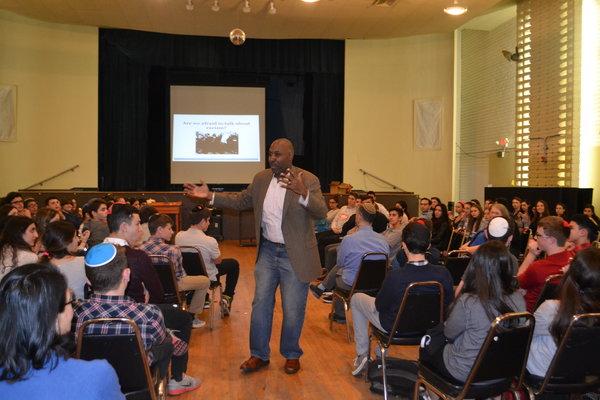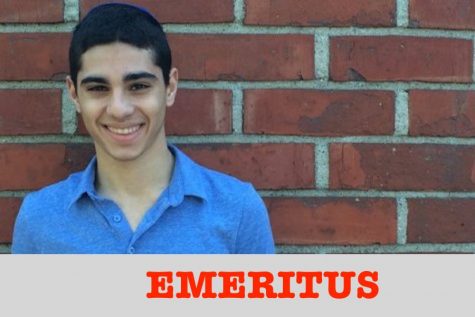Town Hall tackles race issues after Ferguson

DIVERSITY: Mr. Lawton Gray described some of his experiences at Town Hall Dec.23, saying blacks have been treated differently by police.
February 15, 2015
“I once went to a basketball game and got pulled over by a sheriff,” said Mr. Lawton Gray, who is the principal of Oak Avenue Intermediate School in Temple City, near Pasadena.
“We ended up getting frisked, and it was very bad. Has that happened to any of you, for just driving home from a game? All of my friends have also experienced it.”
Mr. Gray, who is African-American and a fellow graduate student with Principal Reb Noam Weissman at USC, was invited to speak at Town Hall Dec. 23, where he led a discussion about racism and racial politics. The visit was arranged in reaction to events in Ferguson, Mo., and Staten Island, N.Y., where unarmed black men were killed by police officers who then were not charged with a crime.
In the New York case, a 43-year-old husband and father named Eric Garner was killed while being arrested for selling cigarettes on a street corner.
“The way we have culturally been treated is very different than the way other people have been treated,” Mr. Gray said. “Does Eric Garner need to die for selling bootleg cigarettes?”
Reb Noam viewed the Town Hall as an opportunity for students to start thinking about these topics, as well as other issues that occur outside of the Jewish bubble of Shalhevet and its students’ various neighborhoods and shuls.
“I think it is incredibly important for us to start the conversation,” Reb Noam said after the meeting was over. “There was no verdict produced, but the purpose of that assembly was to start that conversation led by a leader who has experience from all sides, as opposed to us who live in a world of just Jews.
“It is good to always have different perspectives, especially when talking about an issue that deals with all types of people. I wanted him to frame the issue and for us to have his framing in our minds.”
Mr. Gray opened the discussion saying he hoped the environment would be open and comfortable, encouraging students to speak their minds and not hold back.
“I would love for us to have a true conversation about what is happening today,” Mr. Gray said. “Nobody is wrong in this room, I want you to be open and secure. You can be opinionated, you can be strong-willed. I want to see what this school has to offer about what is happening today.”
After asking students their opinions on racial profiling and affirmative action, Mr. Gray opened up for questions from the audience. Junior Nicole Newman asked whether he prefers to be called “African American” or “black”, and also why the use of the so-called “n-word” is generally condoned within the black community.
His response to her first question was that he had no preference.
“Either one is perfectly fine,” he said. “I am black – actually, I am brown. They are the same, it doesn’t matter.”
When it comes to the use of the n-word, he said that it matters who says it and in what context.
Junior Derek Orenshein asked if Mr. Gray believed blacks are at any fault for current prejudices, or for incidents like the deaths of Eric Garner and Trayvon Martin, an unarmed black teen who was killed by an overzealous neighborhood watch citizen in Florida in 2012 – a white man who was also not prosecuted.
It was at that point that Mr. Gray described being pulled over for no reasons on the way home from a basketball game.
“The concern with Ferguson is that there have been so many of these cases,” Mr. Gray replied, referring to the killing of Michael Brown there. Mr. Brown, who apparently struggled with a policeman over his gun during an altercation at the door of his police car, was later accused of having stolen cigars.
“Why does someone feel the need to kill someone for stealing cigars — does that make sense?” Mr.Gray asked.
Another question came from senior Mati Hurwitz, who asked Mr. Gray whether he thought non-blacks could ever understand racism. Mr. Gray said he thought Jews could, because of the Holocaust, and Armenians could, because of the Armenian genocide during World War I.
Head of School Rabbi Ari Segal responded that he was slightly uncomfortable comparing racism to the Holocaust, and said some Jews might find the analogy offensive. Mr. Gray apologized.
“Forgive me for not knowing about being Jewish — I don’t want you to be offended,” he said.
But sophomore Micha Thau responded that he thought the Holocaust had much in common with the slave trade, especially with slaves’ voyages on the ships that brought Africans to America.
“In history class, we learned about the triangular trade,” Micha said, which included Africans being chained together and stuffed onto sleeping shelves below deck, where many died.
“Our community is also guilty of racism,” said Micha. “I am talking about Jewish circles. I cannot grasp why, but there are a lot similarities between Jewish and black experiences. It boggles my mind why there is rascism.”
Mr. Gray said he was born and raised in a predominately black and Hispanic neighborhood in Pasadena. He said that he tried harder in school than the rest of his siblings, which is what allowed him to “make it out” while his two brothers became gang members.
His cousin was also a gang member, and was murdered a few years ago by a gang.
“He was shot in the face right in front of my little nephew,” he said. “They didn’t have the right home structure.”
After high school Mr. Gray was accepted to UC Berkeley but decided to attend Morehouse College in Atlanta, the alma mater of Martin Luther King Jr. Part of the reason, he said, was that he was afraid that at Berkeley people would think he’d been accepted just because of his race. Morehouse is a traditionally black college.
Mr. Gray said he thought putting more money into education might fix some of the issues blacks face today.
“Education is number one,” he said. And it is all about the money. If you put money into the right places, it will solve many problems. They have no money for after-school programs, and when the kids come home, they have nothing. You really do not understand.
“If you ever have the opportunity to go to an area where parents cannot be parents because they don’t have the means, it is just disheartening.”
Agenda Vice Chair Micah Gill said he had mixed feelings about how the Town Hall had gone, but felt that it had a good impact on the majority of students.
“Town Hall took a turn that we weren’t going for,” Micah said later. “But at the end, I thought it was beneficial for everyone.”
Staff Writer Zack Hirschhorn contributed to this story.













